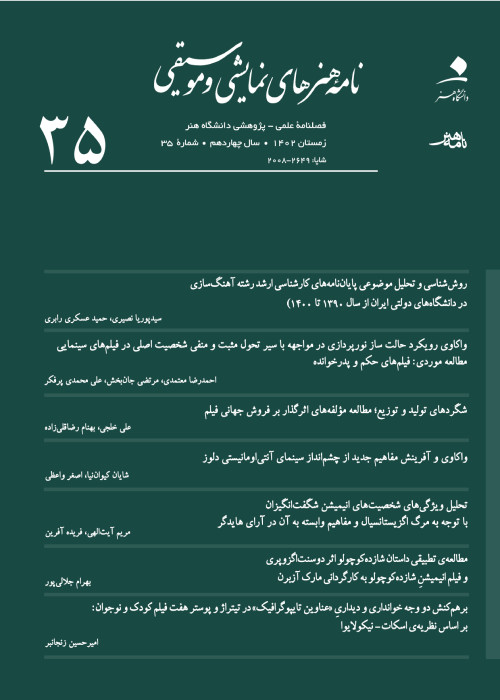The Common and Postmodern Identity: A Sociological Study of “Open Theater” in America
Author(s):
Article Type:
Research/Original Article (دارای رتبه معتبر)
Abstract:
This essay is an attempt to study the contemporary “Open Theater” in America from a sociological point of view. Open Theater stages experimental performances in which society and the idea of being together or communality are radically challenged and questioned. Inclination toward being together is the main formulation behind the formation of identity in these plays. This essay studies Open Theater’s conception of together-ness from the perspective of Jean-Luc Nancy’s theories of the “communal” and “interruption.” These plays view society as the product of communal impulses that reduce identity to passivity to become similar. Identity is the product of fictions imposed by power that withdraw differences and install similarities in the subjects. However, there are some situations in the performances in which the audience encounter activities and sensations that are totally unknown and unseen. These not-yet-experienced moments break the predetermined identity caused by media and popular culture and create new horizons for perception and interaction between the audience and the stage. As a result, this type of theater creates a dualism between the common and the uncommon shared and divided. This subverted binary can be considered as Open Theater’s iconoclastic stance toward postmodern identity and politics. Now the ideas of commonality and communality become the target of scrutiny as they undergo momentary pause on the set. Open Theater, without the conventional politicization of the experimental theater in the 1960s and 70s, challenges identity formation in the American society dominated by media and capitalism. The scenography in Open Theater, along with character delineation, sets forth the process of communality and the pause in this process. Now the ideas of commonality and communality become the target of scrutiny as they undergo momentary pause on the set. The characters’ presence is thus split between being communal or conformist (as in the case of following TV ads), and divided or nonconformist (as in the case of resisting the media codes of behavior and personality). The crucial point to bear in mind is that both of these features occur simultaneously during the performances, and there is no sharp contrast or dividing line between them. Thus, postmodern identity as depicted and performed in Open Theater is an unending struggle and dialectic between the fantasy of being communal and reality of being divided and selfdivided. The reality and unreality of props and dolls brought on the set force the actors to react to their presence in anti-naturalistic gestures that pertain to the impossibility of making a firm decision between congruent and contingent. Contingency is created by the insertion and implantation of scenes in which the audience experience deep shocks via gestures and sounds that are far beyond the everyday and the previously-known. This is how this type of theater achieves radicalization of the idea of society and being social because the audience and the characters undergo coincidence of sociality and a-sociality. Open Theater is the arena for experiencing dualism in perception and identity to come up with new politics of theater without conventional social forms and rules.
Keywords:
Language:
Persian
Published:
Journal of dramatic Arts and Music, Volume:10 Issue: 19, 2020
Pages:
21 to 39
magiran.com/p2106190
دانلود و مطالعه متن این مقاله با یکی از روشهای زیر امکان پذیر است:
اشتراک شخصی
با عضویت و پرداخت آنلاین حق اشتراک یکساله به مبلغ 1,390,000ريال میتوانید 70 عنوان مطلب دانلود کنید!
اشتراک سازمانی
به کتابخانه دانشگاه یا محل کار خود پیشنهاد کنید تا اشتراک سازمانی این پایگاه را برای دسترسی نامحدود همه کاربران به متن مطالب تهیه نمایند!
توجه!
- حق عضویت دریافتی صرف حمایت از نشریات عضو و نگهداری، تکمیل و توسعه مگیران میشود.
- پرداخت حق اشتراک و دانلود مقالات اجازه بازنشر آن در سایر رسانههای چاپی و دیجیتال را به کاربر نمیدهد.
In order to view content subscription is required
Personal subscription
Subscribe magiran.com for 70 € euros via PayPal and download 70 articles during a year.
Organization subscription
Please contact us to subscribe your university or library for unlimited access!



